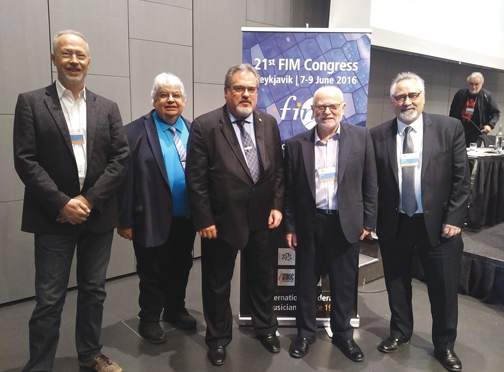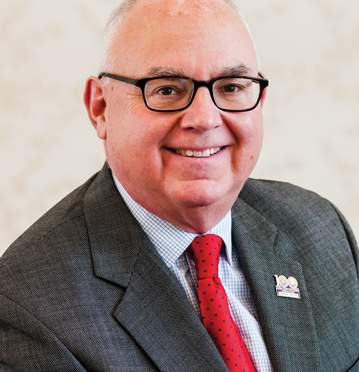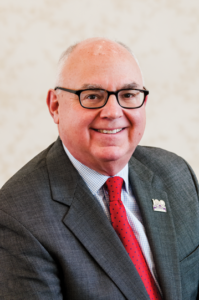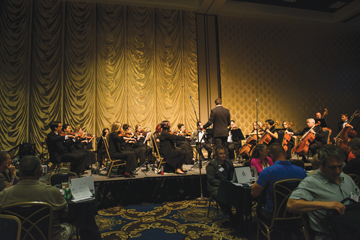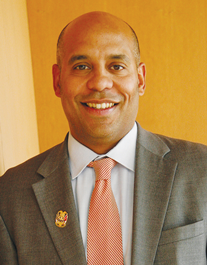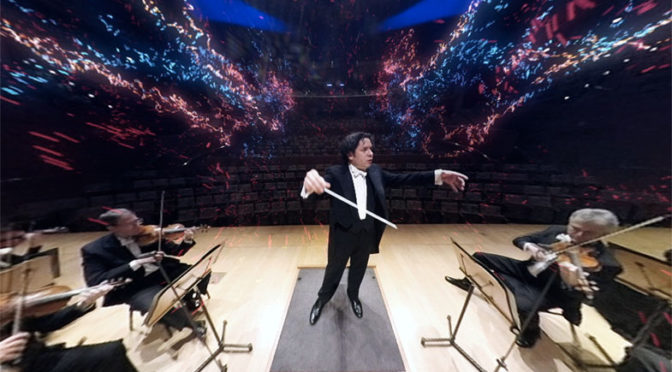 by Bruce Fife, AFM International Vice President
by Bruce Fife, AFM International Vice President
The International Federation of Musicians (FIM) held its 21st Congress in Reykjavik, Iceland, June 7-9. Attending and representing the AFM were Vice President from Canada Alan Willaert, International Executive Board member Tino Gagliardi, and International Vice President Bruce Fife.
FIM brings together musician unions from all corners of the globe. Nearly 100 representatives came to this congress, to share, discuss,
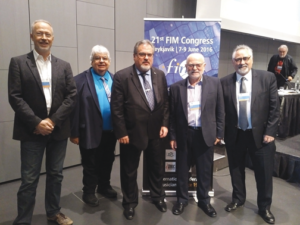
FIM General Secretary Benoît Machuel, AFM Vice President from Canada Alan Willaert, AFM Executive Board Member and Local 802 (New York City) President Tino Gagliardi; FIM President John Smith; AFM International Vice President and Local 99 (Portland, OR) President Bruce Fife.
debate, and act on myriad issues that affect musicians worldwide. Of particular interest to the AFM was achieving a more representative voice within the leadership of FIM in order to assure the issues that are important to our membership have the strongest possible response and input from the international community. To that end, AFM President Ray Hair was elected to the Presidium, the highest executive body of FIM, and AFM Canada also gained a seat on the FIM Executive Committee.
The Congress debated and passed a slate of timely resolutions initiated by the specific unions:
- An exhortation to governments with whom FIM has representations to fulfill and enforce legislation protecting musicians (Uruguayan Association of Musicians)
- Equality for women and men in the music sector (FIM African Committee)
- Recognition of musicians as employees/protected workers, so that they have the same labor rights as other workers (French Musicians Union)
- Work to create fair and transparent distribution of income by collective
management organizations (British Musicians’ Union) - Intensify the “Fair Internet for Performers” campaign to develop additional income for performers from streaming platforms (British Musicians’ Union)
- Work to introduce the “Agent of Change Principle” to our respective governments with the goal of protecting our vital inner-city, grass-roots live music venues (British Musicians’ Union)
- Work to protect the music education systems of Latin America (Musicians’ Union of Rio de Janeiro)
- Work to establish a procedure and database for identifying international airlines with good records for instrument carry-on (German Orchestra Union)
- Create a program for the collection and shipment of musical instruments to Africa (FIM African Committee)
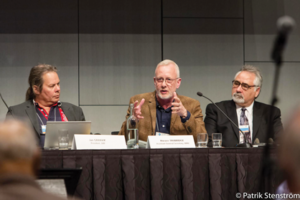
(L to R): Swedish Musicians Union President Jan Granvik, British Musicians Union Assistant Secretary Horace Trubridge, and AFM International Vice President Bruce Fife.
As you can see, the topics are ones we can relate to, or ones we have faced in one form or another, and have either resolved or continue to work on. For example, the AFM has successfully dealt with the issue of traveling with instruments in the US, but once you leave our shores, all bets are off. Also, while I believe that the defunding of our public school music programs may have bottomed out and we’re starting to move in the right direction, much of the rest of the world seems to be where we were 15 years ago, with a downward trend destroying their school music programs because of austerity measures.
There were also numerous panel presentations, one of which I participated on. A robust discussion of online music and related royalty streams with representatives from England, Sweden, Switzerland, France, Hungary, and of course, the US, focused specifically on how we get streaming money into the hands of our musicians. In many ways, the AFM is a step ahead on this issue, based on our involvement with SoundExchange and our AFM and SAG-AFTRA Fund, which were of great interest to FIM representatives.
For me, the Congress highlighted how small our world has become, how the values and hopes of musicians operating in a globalized music industry are interconnected, and most importantly, how we can benefit from hearing each others’ stories and strategizing together about our common concerns. Given our newly elected leadership in the body of FIM, the AFM will not only continue, but also increase its involvement on the world stage.


